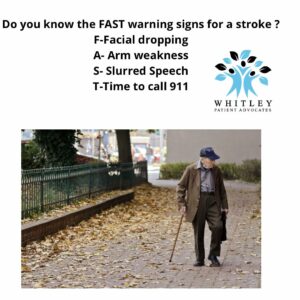Patient Advocates Can Support You Going Home After a Stroke


Going Home After a Stroke
After a major event like a stroke, moving from a hospital to a rehab center, then to home can be very stressful. As patient advocates, we know the worries you carry.
You are likely to worry about your home being safe and if you didn’t have the fear of falling before, you now have it. You will likely worry about having another stroke or some other heart problem after you go home. As patient advocates, this is what we hear from our clients.
After a stroke, many individuals will have physical impairments. The fear of falling is very valid. The Center For Disease Control (CDC) states that 1 in 4 seniors over the age of 65 will fall every year. This is a very real health and safety concern.
Tips for Home Safety
Your home may need;
- A wheelchair-accessible or walker accessible ramp
- Handrails at the entrance to your home and in other places in your home
- Wider doors for a wheelchair or walker
- Floor transitions
Get Started as early as possible. For a safe discharge to occur many organizations will often need to confirm these items at your home. If you are working with a physical therapist to recommend modifications early, take pictures of your home and whow them, that always helps.
Changes such as these can make a huge difference in a successful safe progression to home and an overall increase in activities of daily living. This will also give you peace of mind knowing your home is safe.
Warning Signs of a Stroke
If you are worried about having another stroke let’s go ahead and get you educated on how to know the signs. According to the American Stroke Association, use the F.A.S.T. warning signs. https://www.stroke.org/en/about-stroke/stroke-symptoms
F.A.S.T. warning signs for a Stroke
F– Facial dropping, Does one side of the face droop, or is it numb? Ask the person to smile. Is the person’s smile uneven or lopsided?
A-Arm weakness Is one arm weak or numb? Ask the person to raise both arms. Does one arm drift downward?
S-Speech Is speech slurred? Is the person unable to speak or hard to understand? Ask the person to repeat a simple sentence.
T- Time to Call 9-1-1
Even if the symptoms go away, call 9-1-1 and get them to the hospital immediately.
AS patient advocates we would also suggest you consider a life alert system at this time would be another way to support yourself. A life Alert System is typically a home monitored electronically by a button worn on the wrist or around the neck. Pressing the button will send an emergency signal through your phone line to the monitoring center and they will send help.
Prevent Falls
1 out of 4 older people fall each year and once you fall, you double your chance to fall again.
Here are a few quick tips to help you get started on finding out if you are at risk of a fall.
1. Talk to your healthcare provider to evaluate your risks for falling. They can review your medications, to see if anything will make you dizzy or sleepy.
2. Be sure you have your eyes checked yearly. When wearing bifocals things may appear closer or further away than they really are. You may just want to wear your distance prescription outside.
3. Do strength and balance exercises.
4. Make your home safer. Get rid of things that you can trip over. Add grab bars in your bathroom (shower & near toilet). Add rails to each side of your stairs, and use brighter light bulbs to increase more light in your home.
Always bear in mind that when you go home after a stroke if you have physical impairments you will always need to consider the safety of your home and how to make it the safest possible. This will help you continue or independence as well as keep you from any unnecessary harm.
